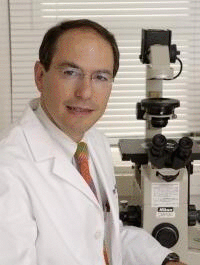Our Science – MIP Website
Molecular Imaging Program

|
Research
The goals of the Molecular Imaging Program (MIP) are to develop and test new imaging agents for use in cancer patients.
The MIP is a multidisciplinary group consisting of imaging scientists, chemists, physicists, engineers and molecular biologists. We have a strong collaboration with Dr. Martin Brechbiel's Radioimmune and Inorganic Chemistry Section of the Radiation Oncology Branch, NCI. We focus on the clinical translation of targeted imaging agents for cancer imaging.
There are three research teams consisting of MRI, Optical and Radionuclide/PET.
MRI Research
We are developing new targeted and non-targeted macromolecular imaging agents for use as lymphatic markers, angiogenic markers and surrogate markers for drugs. Gadolinium-labeled dendrimers of various size are synthesized and injected around a tumor. The dendrimers are taken up by the lymphatics and imaged. Dendrimers have the virtue of many binding sites so that many gadolinium ions can be added to each dendrimer. Because dendrimers (or albumin) mimic the molecular diameter of many different drugs they can be used as surrogate drug markers.
Clinically, we have an active dynamic contrast enhanced (DCE) MRI service to evaluate patients on anti-angiogenesis drugs. We also have an active prostate MRI imaging service which includes both DCE MRI and MR spectroscopy.
Optical Imaging:
Optical imaging is very promising as a guide for surgery and endoscopy. Activatable fluorescent molecules can be targeted to cancer cells whereupon they fluoresce leading to very high tumor to background ratios. Our group is working on activatable optical probes as potential guides during surgery and endoscopy.
Radionuclide/PET imaging
Radionuclide and PET imaging have sufficient sensitivity to perform true molecular imaging. We have experience with radiolabeling antibodies and will be conducting trials with Indium labeled Herceptin. We are anticipating additional human trials with other growth-factor based antibodies. Preclinical work is underway to verify the utility of this approach and to investigate the role of radioimmunotherapy in the treatment of tumors expressing relevant growth factor receptors. Targeted natural and synthetic peptides is another interest of the laboratory.
Facilities include an extensive chemistry and biology lab. Future additions include an imaging center for human and animal imaging and animal holding/procedure facility.
This page was last updated on 6/13/2006.

